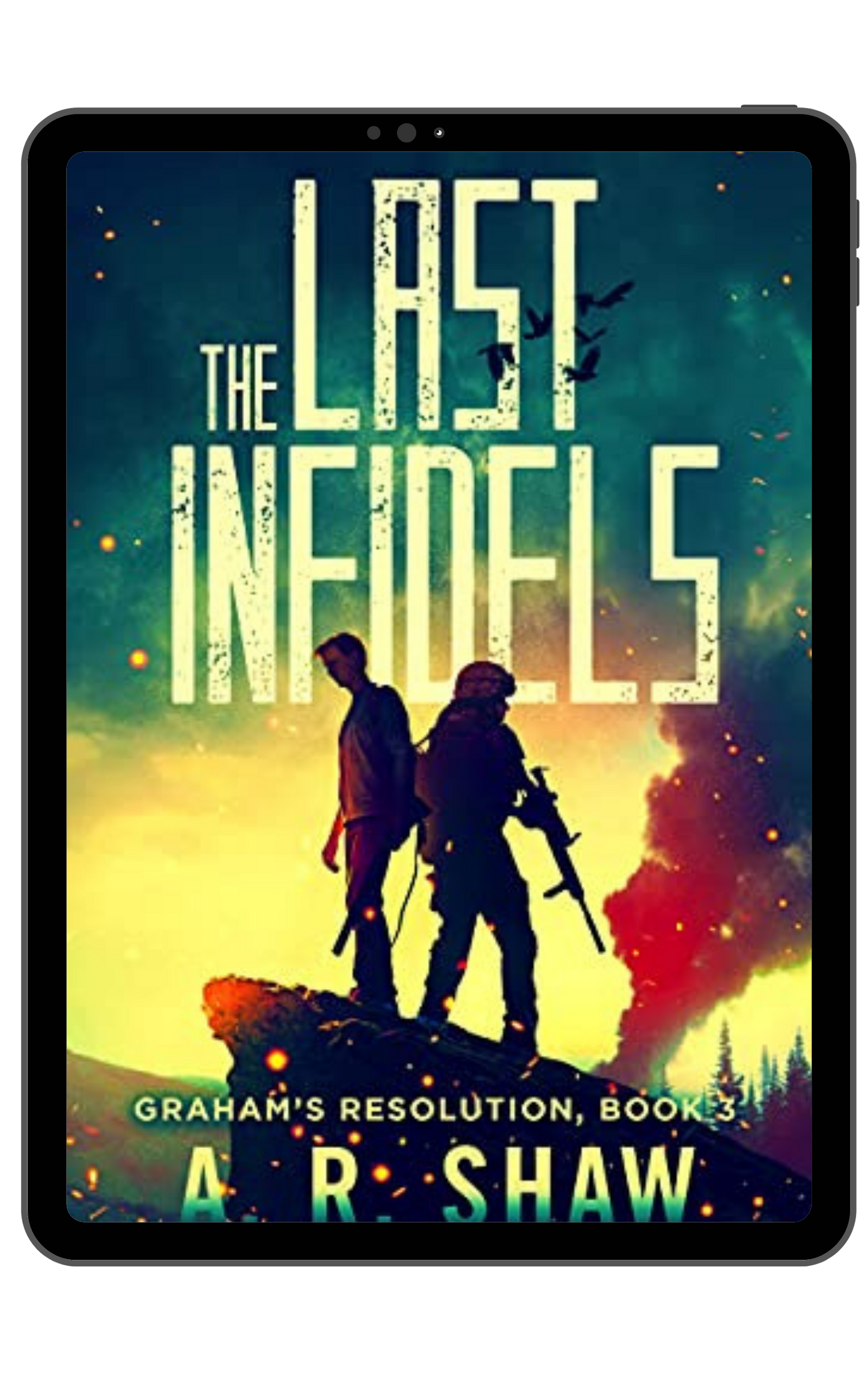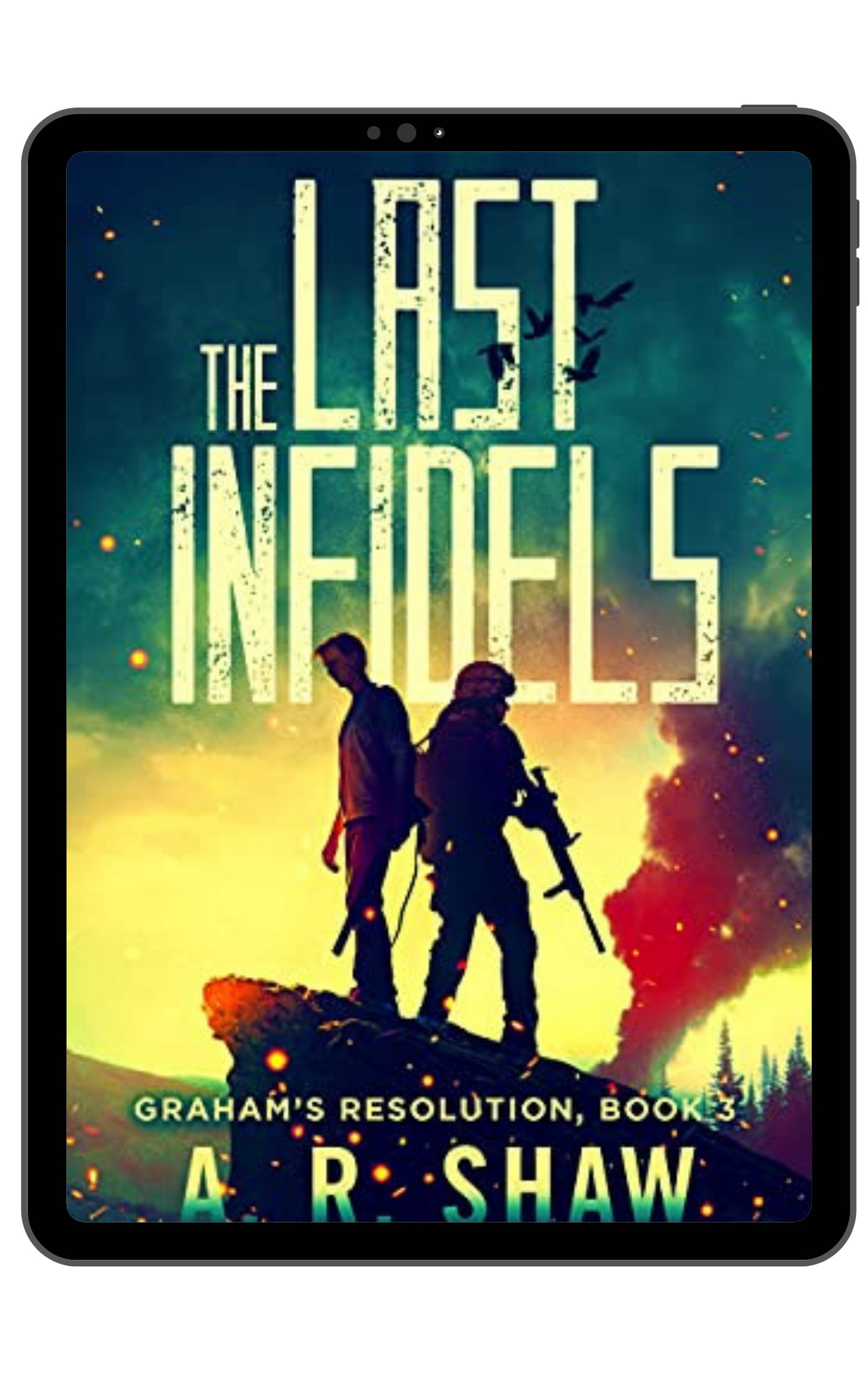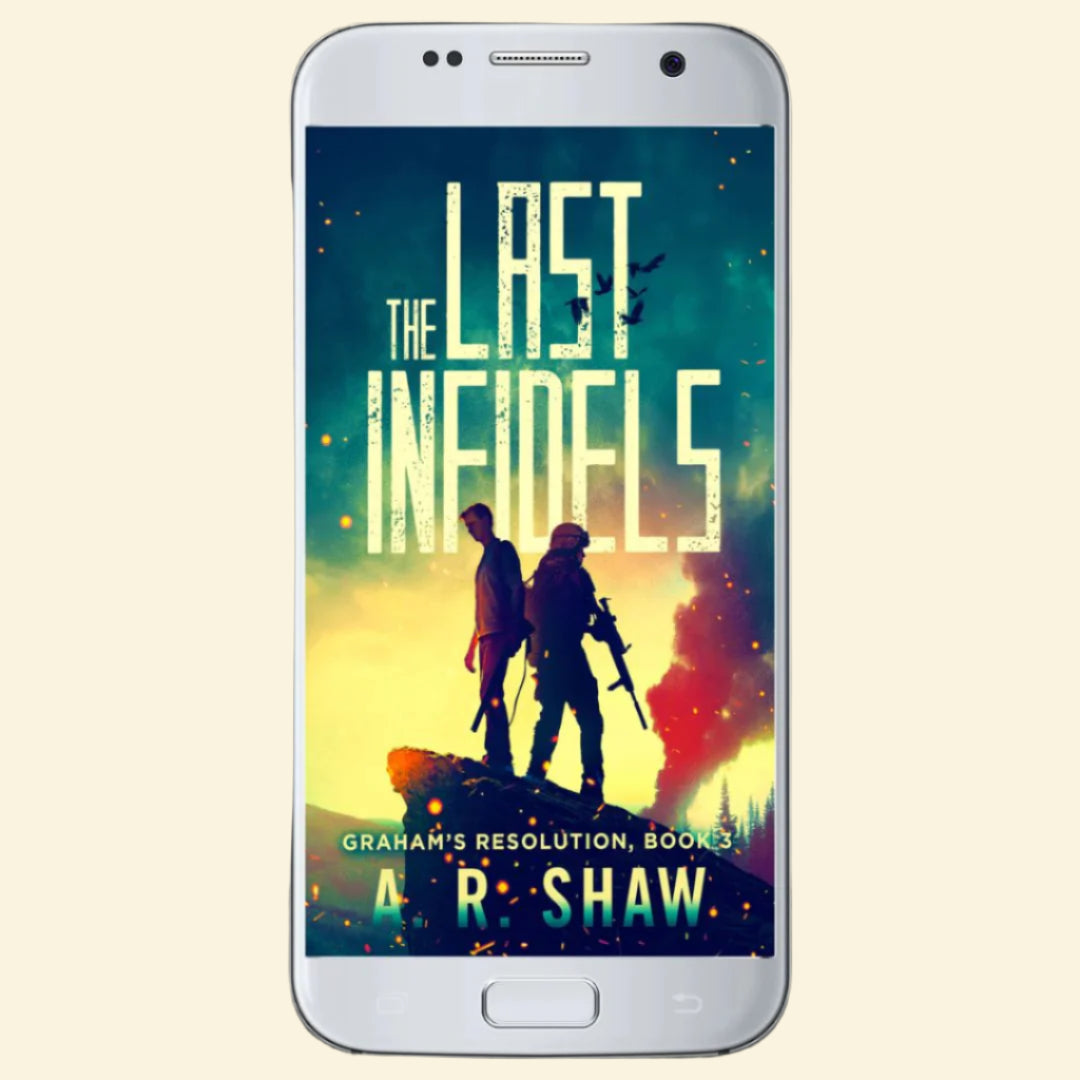Graham's Resolution - Book 3 - The Last Infidels
Graham's Resolution - Book 3 - The Last Infidels
Couldn't load pickup availability
- Purchase the ebook instantly
- Receive download link via email
- Send to preferred ereader and enjoy!
Synopsis
Synopsis
"With the arrival of spring, my people and I finally start to experience some relief. The harsh winter has taken a toll on us, and we are all looking forward to warmer temperatures and longer days.
But just as we begin to settle into our newfound sense of hope, the truth about our situation becomes all too clear.
The pandemic that ravaged our world isn't just a random occurrence or a natural disaster.
No, it's something far more sinister, something that was carefully planned and executed by an enemy we never even knew existed.
As the survivors band together to face this new threat, I can't help but feel a sense of fear."
Sample: The Last Infidels
Sample: The Last Infidels
Dutch’s Caravan
Dutch felt eyes upon them and could almost smell the mares’ fear; the wild dogs had tracked them through the night. After the long march across the state to silently escape from the invaders, to be exposed now by dogs seemed cruel, even for fate.
He raised his hand slowly to signal the driver of the truck behind him to stop, then clenched his fist to have her cut the engine. While he held the reins a whisper’s breath away from the hide of the mares pulling the wagon, Dutch slid his Remington 870 shotgun across his lap with slow stealth. In anticipation of the wild beasts, he had loaded it earlier with a combo load of two number 1 buckshot, followed by two double-ought and then two slugs, for a total of six shots. Practice taught him that loading his weapon in this way allowed extra insurance in case something just kept coming at him. If that did not work, he had other options at his disposal and within reach.
Intent on hearing even the faintest of danger signs, he leaned forward on the bench seat of the wagon and tilted his head to the best angle. Shutting his eyes in concentration furthered the conscious effort. He had ridden without care before the dark descended; the wild dogs’ howling had already warned him of their carnivorous intentions come nightfall. Their glowing eyes shone through the darkening forest at regular intervals as the day lengthened into dusk.
The time to start a fire and make camp had passed, and the steady cadence of the five-ton US Army truck and trailer, loaded down with provisions, rang out as it trailed the little convoy to the outskirts of Cascade. The provisions were intended for a new homestead, Dutch’s mission now. He led in a wagon burdened much like the truck. Two lineback horses who were acutely aware of the present danger pulled the wagon.
The young woman driving the truck behind him had come in handy, but if it had not been for the need to drive both vehicles, Dutch would have kicked her out near the Coulee Dam on State Route 20. He was not only afraid of being tracked by the invaders but also grew worried that he was beginning to feel responsible for the safety of the woman who was a mere child in age compared to him. In his mind, the liability she posed could mean the death of both of them, and he wanted no charges now or ever again.
He planned to send her away at his earliest convenience. She’ll have to take care of herself, Dutch kept telling the nagging voice deep within his mind. At almost fifty years of age, she appeared to be in her early twenties and needed no protector, especially not someone like him who was nearly fifty. Babysitting a whiny twenty-something—particularly in a survival situation—held not a shred of appeal to him.
Not that she was whiny, really; on the contrary, she irritated him because she did not talk. Hell, from the moment they’d met around Saint Maries, south of Coeur d’Alene, Idaho, four days earlier, she’d nearly driven him mad with her silence. Unfortunately, he had little choice but to let her tag along, since he had not run across another living soul all the way here. She was a good worker, he’d give her that. He would allow her to stick around for a few more days until she got her bearings, and he hoped that the current residents of Cascade would take her in after he warned them of the coming danger. He intended to fill a backpack for her, give her one of the mares tied to the back of the wagon for payment, and send her on her way.
The real reason he had dared take her along at all was that he knew the reality if he’d left her behind: she would have succumbed to the invaders. Since they had already entered the country, he suspected they would, by now, be hunting along Interstate 90 and taking inventory of their newly conquered land.
The invaders had simple rules, really—either join their ranks or die. They didn’t bother wasting ammunition; they did the deed with brutal sincerity, using their bare hands or the blade of hatchet, knife, or sword. To kill this way was their animalistic preference. It was the same way they handled things in their own countries. Ammo they saved for hunting; slaughtering by blade was their choice for infidels and nonbelievers. They were the boots on the ground . . . only this time, it was American soil they tread upon.
China was merely the provider of the weapon, and double-crossing China wasn’t difficult for them. The Chinese had the weaponized version of the virus under coolant in their labs already, so it was merely a matter of money and information to complete the exchange. What China didn’t take into consideration was the need to deflect blame. Purposely exposing the Chinese for developing the virus was only fitting; it ensured that the world saw them as the only possible culprit in the death of hundreds of thousands.
Invasion was phase 3 in an elaborate five-step world domination plan for jihad. First they implemented the H5N1 virus by weaponizing it via several self-sacrificing subjects; once virulent with the deadly strain, they boarded airplanes with circulating air systems, thus making each passenger also contagious. The unsuspecting couriers then returned to their colonies to die and, in doing so, achieved genocide by spreading the virus exponentially.
Second, they waited and let the hand of death take its toll. While manipulating their own statistics to reflect a higher mortality rate than they suffered was the easiest of deceptions, the sacrifice of thousands of their own for jihad prevailed as imperative. However they committed the deed, it was essential that they use hate in any form to wipe out most of humankind—no offense was too vile, no taboo ruled out, nothing considered sacred.
Since the infiltration took place early on, Europe fell easily and was destroyed from within. Now, all that remained of the United States would soon be dominated as well. Jihad was a long-term plan. With the first steps implemented, they were gleeful with the results so far—America, as it had been, was no more.
Dutch had been on his second tour in Iraq when an improvised explosive device took out his lower left leg, right below the knee. That was it for him. Throughout his recovery and remarkable transition to prosthetic use, he had tried to convince his supervisor that he was in even better shape than before. Rules were rules, however, and section 313 of the army regulations had clearly put him in the discharge column. After a long recovery, he’d packed up his gear and headed back to the States.
After making his way to his father’s abandoned ranch south of Coeur d’Alene, Idaho, he threw himself into farming and ranching with every shred of intensity he had used in war. He had no other real options. He’d never married, and his parents had passed only one year before his injury. He was happy it had happened this way; he wasn’t sure if his mother could have taken it. His father, on the other hand, would have expected him to stand until the end.
His brother Clive lived in California. He’d called Dutch twice when the pandemic hit hard. The first call was to say that his wife had the virus, and the next call brought the news that their daughter had passed right after her. Dutch was not surprised to hear him say he was going to take his own life right after he hung up the phone, and he did not try to stop Clive. He couldn’t blame him. What was there left to live for? He said only, “I love you, brother,” before the call ended.
Dutch had heard this same sad story all over the country, and he waited to catch the inevitable virus. He welcomed its presence; he even went out to a couple of local bars—after nearly killing himself working on the ranch—in anticipation of contracting the damned thing, but it just never took hold in him. He woke up with the sniffles once and thought, Okay, here it comes, but in a few days they cleared up. In time he found himself, well . . . disappointed.
Dutch helped his neighbors and took care of their livestock when he could. Then they began to die off, one by one, until one day he realized he was the only one driving through town. He went around to the deceased farmers’ spreads and let loose their livestock: cattle, horses, donkeys, pigs, sheep, goats, and chickens. He just opened the gates and watched them roam away, tentative at first but free to graze along with the mule deer and roaming elk herds. No one else was coming to care for them, so he figured it was his duty to let them go rather than to let them starve in their stables; at least they stood a chance at adapting to the wild side of life, rather than die outright of starvation.
Then he started listening in on radio transmissions for any traffic coming or going. He hadn’t heard much until a few months ago. The first intelligent noise he heard was a Morse code transmission on the high-frequency band coming from the northeastern area of Washington state. At first he thought it was an automatic repeater beacon someone had never taken the time to turn off. Dutch was a bit rusty on translation, and it took him a while, but when he finally figured out the dits and dahs, it came as a shock to find there were more survivors out there.
He wanted to make contact, but didn’t trust anyone out there just yet. He waited, leaving the option open for later. Then Dutch began overhearing transmissions of a different kind, and that set his mind reeling. He wasn’t as thrilled about this new discovery. It was a voice transmission in a language he’d only run into in faraway war-torn lands where bombs lay hidden and even women and children were suspect because they, too, might kill you.
After a few days of increased activity Dutch’s mind began connecting the dots. Could this whole thing have been a planned attack? There were no other inferences to make. The conspiracy theorists had been right all along. At first it had been only a suspicion that the virus was weaponized; now he was sure those suspicions were founded on truth.
Dutch rarely spoke aloud in his lone residence unless it was to his two dogs. When the reality sunk in about what the overheard transmissions meant, he said to the empty room, “You couldn’t fight us man to man . . . you goddamn cowards.”
After monitoring the Morse-encrypted transmissions for a few more weeks, Dutch realized that the worst of his fears had come true: an invasion of the United States was in progress. They had already sent several teams ahead to secure major cities. Hell, they were already here during the virus phase, just lying in wait and hiding in the shadows. Dutch knew they must have had some kind of vaccine available to them, or they wouldn’t take the risk.
Then, after a few more weeks, the enemy moved north of him by dark of night. They were traveling the interstate highways in long, raucous convoys and clearing communities of survivors. He mounted a reconnaissance strategy to scope them out on horseback before making plans to bypass them and warn the northerners. He couldn’t risk them intercepting a radio transmission from him that would expose his own location. Traveling by horseback wouldn’t be too daunting; he only had to go from Saint Maries to Coeur d’Alene.
During a reconnaissance outing on a dark, cold, spring night, Dutch had heard the ramping up of hostile chatter and then witnessed the death blow as a survivor—another one who couldn’t live with the intruders’ ways—begged for his life; eventually the man put down his weapon and submitted to his own demise by a brutal beating not fit for even the worst of criminals.
That was the same night that Dutch had encountered the redheaded girl dressed in a black burka. She fled through the darkened forest toward him like a scared deer, nearly revealing their position; when he caught her she fought bitterly. He saw the terror and the bruising, and contemplated breaking her neck without delay to put her out of her misery; doing so would have been merciful. Instead, when she became limp in his grasp and opened her frightened light-green eyes to the horrific scene, as if trying to wake from a nightmare, he pulled her backward. Using the night to blanket their retreat, he kept her from uttering a sound until they were miles away.
When he removed his hand from her mouth, she didn’t speak—not even when he asked her name. She only held onto his torso with clenched fists, gradually becoming limper as he guided her away under the cover of darkness.
Dutch didn’t sleep that evening; instead, he packed up his campsite. He loaded his belongings, and then the girl—as though she were one of his possessions. Then, on horseback, they made their way back to his ranch in Saint Maries. She was asleep when they arrived at his cabin just before dawn.
He had pulled her limp, frail body down from Gus, the same lineback horse who was now in the lead of those pulling the wagon. After laying her down in the cabin, the dogs Elsa and Frank began to investigate the stranger; they nudged their wet noses into the flaming red hair that fell over her sleeping face until Dutch gave the hand signal that never failed to correct the well-trained, ex-military Belgian shepherds. Instead of investigating, they guarded her while Dutch took care of the outside chores.
Shortly after dawn the girl had opened her eyes through the sleepy veil and immediately retreated up and away from the canines until her back met the wall. She was terrified of the pair’s gleaming eyes, even though their tongues lolled out of their mouths, forming ridiculous smiles for such supposedly fearsome creatures.
Dutch couldn’t help himself, and he chuckled as both dogs eyed her curious behavior. As she spun in his direction, he caught her wild look —one that meant to murder him in cold blood if possible.
“Hey now,” Dutch said in reproach while he signaled with one hand for the shepherds to lie down. As they moved away, so did the girl’s deadly stare, and Dutch watched as her attention fought to seek which was the greater threat in her view.
“No one’s going to hurt you.” He paused, and then added, “Unless you try to kill me; then, forget it.”
She refocused on him, not uttering a word. Then he watched as the inevitable happened: her eyes followed the line of his tall frame down the right side of his leg where instead of a boot, as expected, she saw the metal prosthesis. It never bothered him, and he’d gotten used to the occasional stares. He’d never been one to beg for sympathy, so he seldom commented on it. He wasn’t angry about it either, as counselors would have had him believe. He wanted none of the bullshit that went along with being injured. To Dutch, they won if he gave them that satisfaction, so he had ignored the conclusion he knew her mind would eventually come to.
“Do your part, don’t steal from me, and we’ll get along fine. I’m leaving here, and I can use your help. If you don’t want to go, you’re welcome to stay here. I’m warning you, though: the cabin won’t be safe for long with the invaders around. The decision is yours to make. You probably want time to think about it, but we don’t have the luxury of time. I’m headed northwest to a camp with other people; I’ll bring you with me. It’ll be safer in numbers against these guys. You can come, if you help get us there. Tell me now. We leave at nightfall.”
The dogs Elsa and Frank had followed the conversation and turned their heads in unison for the girl’s answer. After a moment’s contemplation, she simply nodded.
Dutch remembered the sullen expression she had given him that day. That was weeks ago now, and they’d finally made it into Cascade, where the Morse code message beckoned them. He’d escorted both of them safely out of danger and kept them fed. He thought she at least owed him a little faith by now, but she still didn’t show any sign of trusting him—not even enough to tell him her name. And now, he figured, he’d never learn it because they were about to be eaten by ravenous wild dogs.
Of course, he wasn’t about to let that happen easily; at the very least, he’d make sure they choked on every bit of him.







